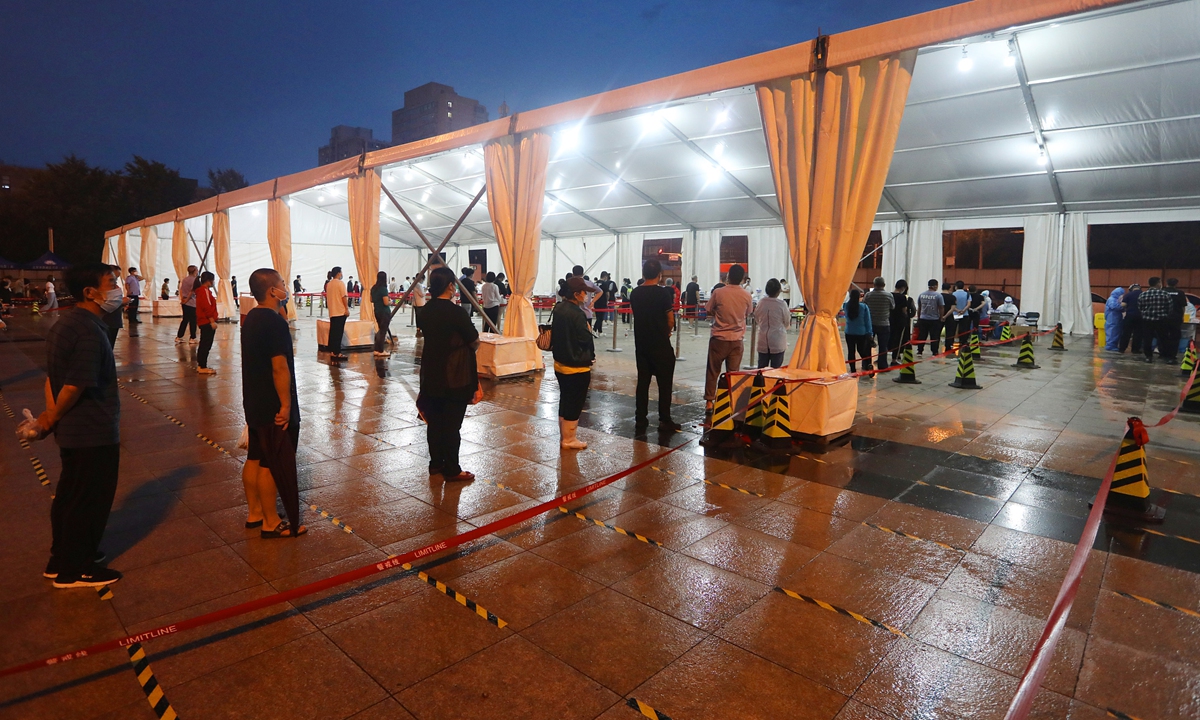Wuhan sends medical teams to aid Beijing amid COVID-19 resurgence, returns kindness
By Wang Qi Source:Global Times Published: 2020/6/21 18:38:40

Medical workers conduct nucleic acid tests for the coronavirus for employees in the catering industry at the south square of the Beijing Exhibition Center on Thursday afternoon after a heavy downpour. Photo: VCG
Two months after Beijing's last medical team left Wuhan, Hubei Province, medical teams dispatched by six Wuhan-based hospitals arrived in Beijing on Saturday, supporting China's capital as it gears up testing capacities amid the latest resurgence of coronavirus.
More than 70 medical personnel, averaging 27 years old and most of whom have expertise in medical laboratories, arrived in Beijing, Chinanews.com reported on Sunday, noting that they also carried nucleic acid testing equipment, medicines and protective equipment.
"Our main job is to raise Beijing's nucleic acid testing capability, help local hospitals reach a daily testing volume of 6,000-8,000 people," Ye Guangming, the leader of a medical team from Zhongnan Hospital at Wuhan University, told the Global Times on Sunday.
According to Ye, two Wuhan medical teams will be in charge of one hospital in Beijing, including The Beijing Hospital, which Ye's team assisted, as well as the Peking Union Medical College Hospital and the China-Japan Friendship Hospital.
"The Beijing Hospital is renovating its equipment to transform its pathology laboratory into a nucleic acid testing lab… we are expecting to start our work on Monday or Tuesday," said Ye.
Beijing registered 22 new COVID-19 cases on Saturday, bringing the total number to 227 since a resurgence of infection cases occurred at Xinfadi wholesale market on June 11.
In the past week, the number of people sampled for nucleic acid tests in Beijing has increased from 8,000 to nearly 500,000 per day, with about 2.3 million samples collected as of Saturday, media reported.
Beijing has set up 2,083 testing sites and 7,472 staff members from 59 hospitals, 28 third-party testing institutions and 20 disease control and prevention organs have been mobilized for sampling, media reported. But the task is still challenging for a city of 20 million residents.
"All members of the medical teams from Hubei signed up voluntarily. Beijing supported Wuhan when we were in trouble, and we certainly need to give our hands when Beijing is in need," Ye said.
Beijing dispatched a total of 800 medical staff to aid Wuhan's fight against the virus since January and the last team returned to Beijing on April 15.
"The mutual aid shows our solidarity and courage, and such a country can overcome any difficulty," commented an internet user on Twitter-like Sina Weibo.
By June 1, a total of 35,800 milliliters of plasma donated by about 150 cured patients from Wuhan had been transferred to Beijing, Inner Mongolia Autonomous Region, and cities in Northeast China's Jilin and Harbin provinces to assist the treatment of coronavirus patients, media reported.
RELATED ARTICLES:
Posted in: SOCIETY,FOCUS